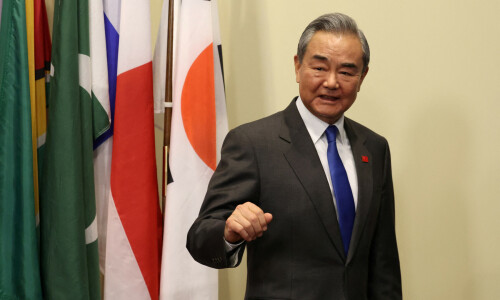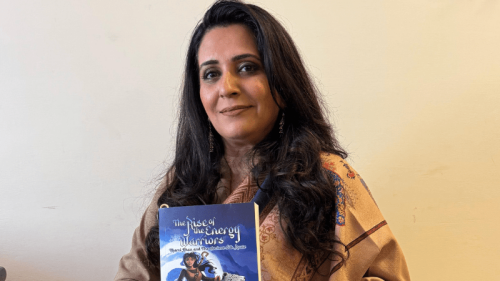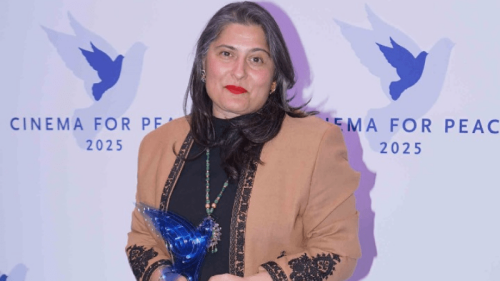ISLAMABAD: Pakistan and Turkey on Friday agreed to transform their ties into a strategic economic partnership.
The two sides, which signed 13 memorandums of understandings (MoUs) including a joint declaration after the sixth meeting of the High-Level Strategic Cooperation Council (HLSCC), importantly approved a Strategic Economic Framework (SEF) and an accompanying elaborate plan of action to implement the new vision for the ties.
The SEF aims at realising the target of enhancing bilateral trade to $5 billion by 2023 from the current $800 million.
Turkish President Recep Tayyip Erdogan, while speaking at a press conference with Prime Minister Imran Khan after the signing ceremony, described the SEF and the 71-point plan of action, as the “roadmap for deepening economic cooperation”.
13 MoUs, including a joint declaration, signed
Mr Erdogan, who was on a two-day visit to Pakistan for co-chairing the HLSCC meeting, vowed to extend all help in Pakistan’s socio-economic development.
He said: “Turkey is ready to provide all support in transport, energy, tourism, healthcare, education, and law-enforcement, which will help in socio-economic development of Pakistan.”
The MoUs signed by the two governments relate to fields of standardisation, conformity assessment, metrology and training; diaspora policy; media; development and facilitation of tourism; halal accreditation; trade facilitation and customs cooperation matters; railways; postal services; military training; and hydrocarbons.
These agreements were the outcome of discussions at the HLSCC, which steers the bilateral relationship and its working groups.
In another development the two sides agreed to expand the scope of the HLCC, which previously had seven joint working groups focusing on political coordination; trade and investment; energy; banking and finance; transport and communications; culture and tourism; and education. HLCC has now got two new groups on defence industry cooperation and water and agriculture.
Mr Erdogan said that the defence cooperation was the “most dynamic element” of the bilateral cooperation.
Underscoring the importance of investments for job creation, improving productivity and competitiveness of Pakistan, he hoped that Prime Minister Imran Khan would improve the business climate in Pakistan.
Mr Erdogan reaffirmed his support for Kashmir. He said Turkey was in “deep solidarity” with the people of Kashmir suffering Indian oppression. He noted that the situation in occupied Kashmir had deteriorated because of India’s “unilateral action” of annexing the region in August 2019 and called for peaceful settlement of the dispute through dialogue.
The Turkish president offered Islamabad his help for improving ties with Kabul. Both Pakistan and Afghanistan, he said, were Turkey’s brotherly countries and he would like to see them enhance their relations.
He thanked Pakistan government for supporting Turkey’s military operation in Idlib (Syria) and helping in taking control of Pak-Turk schools that were previously run by his opponent Fethullah Gülen.
PM Khan, on this occasion, said that Pakistan was in particular looking forward to benefitting from Turkish expertise in tourism, construction of low-cost housing, and economic revival.
“Turkey was in a situation similar to what confronting Pakistan today when Mr Erdogan came to power with circular debt and IMF loan hurting their economy. We want to learn from their turn around,” Mr Khan said.
He said that Pakistan and Turkey were opening a new chapter in their ties in which timelines had been set for progress. “Both countries would benefit from cooperation, but Pakistan would be the bigger beneficiary,” he said.
Foreign Minister Shah Mehmood Qureshi, in a presser at the Foreign Office after Mr Erdogan’s departure, said that the visit had shown that historical ties between Pakistan and Turkey were growing in strength and they had remained unaffected by Pakistan’s decision not to attend the Kuala Lumpur Summit.
Defence ties discussed
Turkish Defence Minister retired Gen Hulusi Akar called on Chief of Army Staff Gen Qamar Bajwa at the General Headquarters to discuss defence ties.
“During the meeting, matters of mutual interest, regional security and measures to further enhance bilateral defence collaboration were discussed,” says an ISPR statement issued here.
“The COAS said that Pakistan values its unique relationship with Turkey and would always stand by our brothers,” according to the ISPR statement, which further noted that the Turkish defence minister appreciated Pakistan’s contribution for conflict prevention in the region and for standing by Turkey. He pledged to reciprocate that support.
Published in Dawn, February 15th, 2020















































